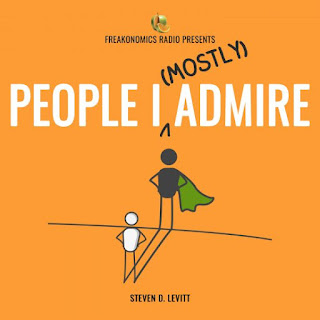The People I (Mostly) Admire Podcast is an interview show. There are thousands of interview podcasts. Some of these interviews shows are wildly popular like Joe Rogan where people are interviewed who punch and kick each other in the face and body for a living, call themselves comedians, and are bona fide experts in a subject of importance like nutrition. Then there's the podcast with a guy from Minnesota who interviews people at the Mall Of America. He gets four downloads an episode, presumably from the people he corrals in the food court.
Whether a million or ten listeners, interview podcasts are the low-hanging fruit of podcasting. So many people believe that they can interest total strangers into listening to a recorded conversation with other strangers.
But the interview podcast done well is deceptively hard. The degree of difficulty approaches that of the hardest dive during Olympic competition. Perfection is elusive. A belly flop is a far more likely outcome.
People I (Mostly) Admire has Freakonomics DNA, so, by definition, it's more thoughtful and thought-provoking than the average "so tell me what you thought of this season's The Bachelor show."
Sometimes, host / economist Steven Levitt has well-known people on the podcast, such as Mayim Bialik, Sue Bird, or Ken Jennings. More often, Levitt invites people who suffer the arrogance of being the smartest person in the room or the courage to give the finger to conventional wisdom. Think mathematician Sarah Hart, author Jared Diamond, economist Austan Goolsbee, and psychologist Dan Gilbert.
"I've had 70 or 80 guests on this podcast, and I have to say, it was harder to prepare to talk to you than any of the other guests I've had," Steven Levitt tells best-selling historian Yuval Noah Harari at the end of the latest episode of People I (Mostly) Admire, Levitt's interview podcast from Freakonomics Radio Network. Harari's work is nuanced and complex, allergic to easy answers or wrapping up history into neat lessons.
In this fascinating conversation, Levitt and Harari talk about his 2014 book Sapiens - 23 million copies sold and counting - and spiral out (way out) from there. For instance, Harari explains why Covid may have a smaller impact on human history than we expect:
"In the long run, generally, pandemics have a smaller impact on history than other catastrophes like wars. You compare the First World War to the Spanish influenza of 1918, 1919, many more people died from the flu. But until Covid, people hardly even thought about it. And its impact was really far smaller. The first World War shaped the modern world. Even you think about something like art, so many new art forms came out of the trenches. So many great works of art. If you think about poetry like Wilfred Owen, if you think about painting like Otto Dix. You think about entire artistic movements. The Spanish influenza, nothing. There is no famous poem. There is no famous painting. There is no artistic genres that came out of it. And that's true even if you look at the Black Death. It was maybe one of the biggest catastrophes in human history. Europe before and after the Black Death, there are, of course, differences, but there was no regime change in any country. You have the same political systems. You have the same economic systems before and after. Maybe because we are programmed to it. Evolutionarily, we are perhaps better at dealing with diseases than we are with man made catastrophes like wars."And why he thinks scientific progress will lead to our extinction:
"Then there is another frightening scenario: that we will use the immense powers of bioengineering and artificial intelligence and so forth to try and upgrade ourselves, or try and create a new super species. And because we don't really understand the consequences of what we are doing, it will be a downgrade. If you give, for instance, to armies and big corporations the power to re-engineer humans, they are likely to try and amplify those human qualities that they deem the most useful to them. Qualities like intelligence and discipline. You want highly intelligent and highly disciplined employees and soldiers. Other human qualities like compassion, like artistic sensitivity, spirituality, most armies and most corporations, they don't need spiritual employees or soldiers with a very deep sense of compassion or a deep sense of artistic beauty. And if the result will be a race of superhumans who are highly intelligent and highly disciplined, but they lack compassion and they lack artistic sensitivity and they lack spiritual depth, this will be a terrible catastrophe, especially as this is kind of permanent. It's very difficult to go back.
"If you think about the totalitarian regimes of the 20th century, whatever harm they did, in the end, you can go back to basics — to the human body, to the human mind. Hitler, Stalin, Mao, they tried to create a new man, but they failed because they didn't have the technology. The Stalins of the 21st century, they will have the technology. And this is extremely frightening."
The full conversation touches on many more topics as well, from why money is a fiction to how politicians have a right to say stupid things in private.
Listen to People I (Mostly) Admire at freakonomics.com or on any podcast platform.

Comments
Post a Comment
Thank You for your input and feedback. If you requested a response, we will do so as soon as possible.